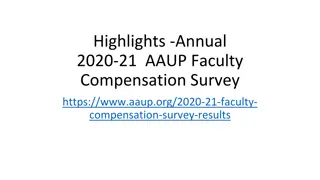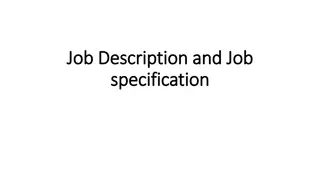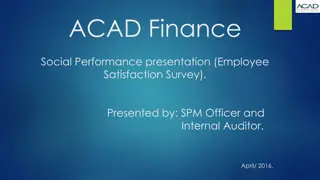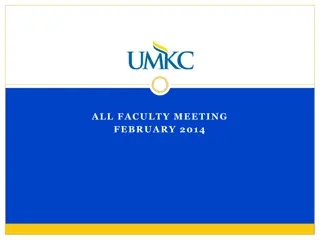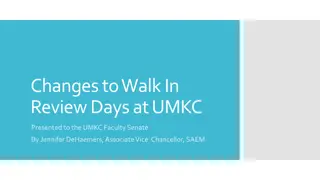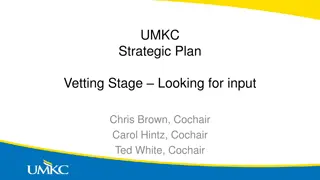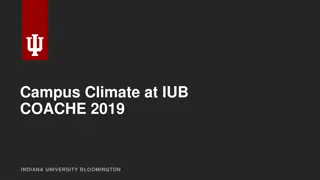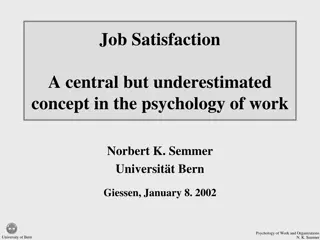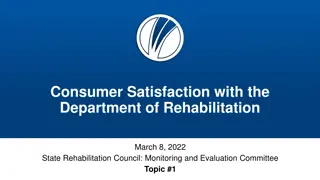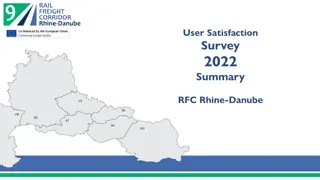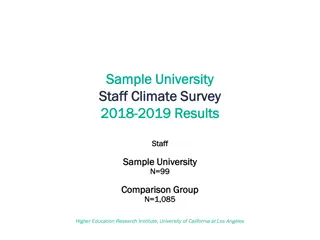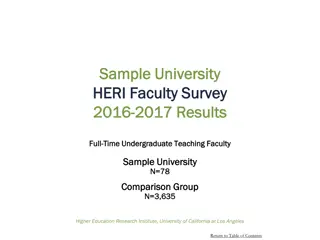COACHE Survey Results and Faculty Job Satisfaction at UMKC
The COACHE Survey results compiled from the Collaborative on Academic Careers in Higher Education provide insights into faculty job satisfaction at the University of Missouri-Kansas City (UMKC). The survey conducted in Fall 2013 highlighted strengths, areas for improvement, and key aspects of working at UMKC. Actions taken based on the 2008 survey, such as addressing tenure issues, led to positive changes in tenure policies. The results also identify benchmark areas like interdisciplinary work promotion, leadership, and appreciation/recognition. Future steps include sharing data with academic deans and engaging in conversations to enhance faculty experiences at UMKC.
Download Presentation

Please find below an Image/Link to download the presentation.
The content on the website is provided AS IS for your information and personal use only. It may not be sold, licensed, or shared on other websites without obtaining consent from the author. Download presentation by click this link. If you encounter any issues during the download, it is possible that the publisher has removed the file from their server.
E N D
Presentation Transcript
Faculty Job Satisfaction Survey DATA COMPILED FROM THE COLLABORATIVE ON ACADEMIC CAREERS IN HIGHER EDUCATION (COACHE)
COACHE Survey Consortium of over 200 colleges, universities, and systems across North America. Membership enables colleges and universities to build a culture of success and maintain a vibrant faculty. COACHE's tools are designed to generate actionable diagnoses. Participated in Fall 2008 and again in Fall 2013 In 2008 the focus was on Tenure-Track faculty only In 2013, the focus was expanded to include Tenured faculty 222 faculty participated in Fall 2013 (56% adjusted response rate) 5 peer institutions: UMASS-Lowell, SUNY at Buffalo, UNC Charlotte, Kansas State University, and the University of Alabama
Evidence of COACHE Effectiveness One of the largest areas of concern from the 2008 survey surrounded tenure policies, clarity and reasonableness We will share actions taken at UMKC as a result of the survey from 2008 to address tenure issues We will also share how tenure policies, clarity, and reasonableness not only improved but became a noted strength for UMKC in the 2013 survey results
2013 COACHE Survey Results We will share benchmark areas identified as strengths from the 2013 survey results We will also share benchmark areas identified as areas for improvement These include: Interdisciplinary Work Promotion (Associate to Full Professor) Leadership (Senior, Divisional, and Departmental) Appreciation and Recognition For each benchmark we will share best practices from COACHE and engage the faculty in conversations about implementing such practices at UMKC
2013 COACHE Survey Results Finally, we will share aspects of working at UMKC that were identified most frequently as being the worst or best Worst Compensation Lack of support for research Quality of Leadership Too much service/too many assignments Best Quality of colleagues Cost of living Support of colleagues Geographic location
Next Steps One of three presentations to faculty Please encourage the faculty in your units to attend one of these presentations Video modules are being created to share and explain the COACHE data in more detail Data will be shared with the academic deans regarding their perceptions of the faculty in their particular units There will be continued conversations in the Spring regarding what the survey results are telling us and what potential actions may need to take place in order to improve in areas of need; similar to what was done in regard to tenure clarity following the 2008 survey





